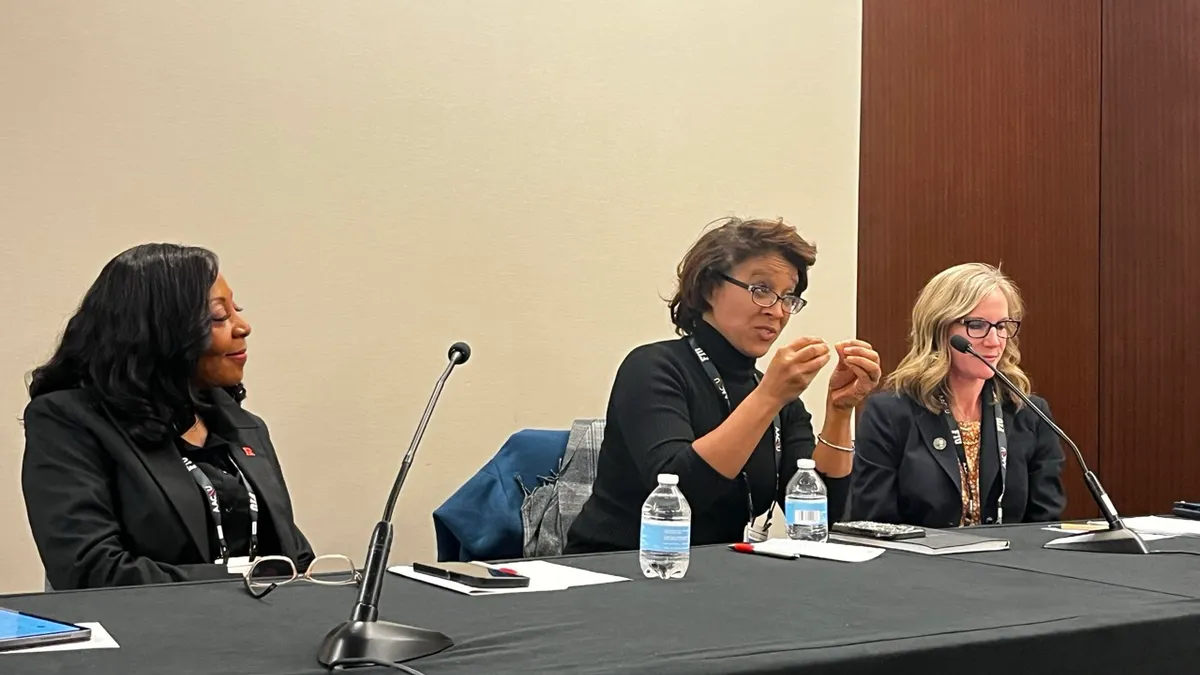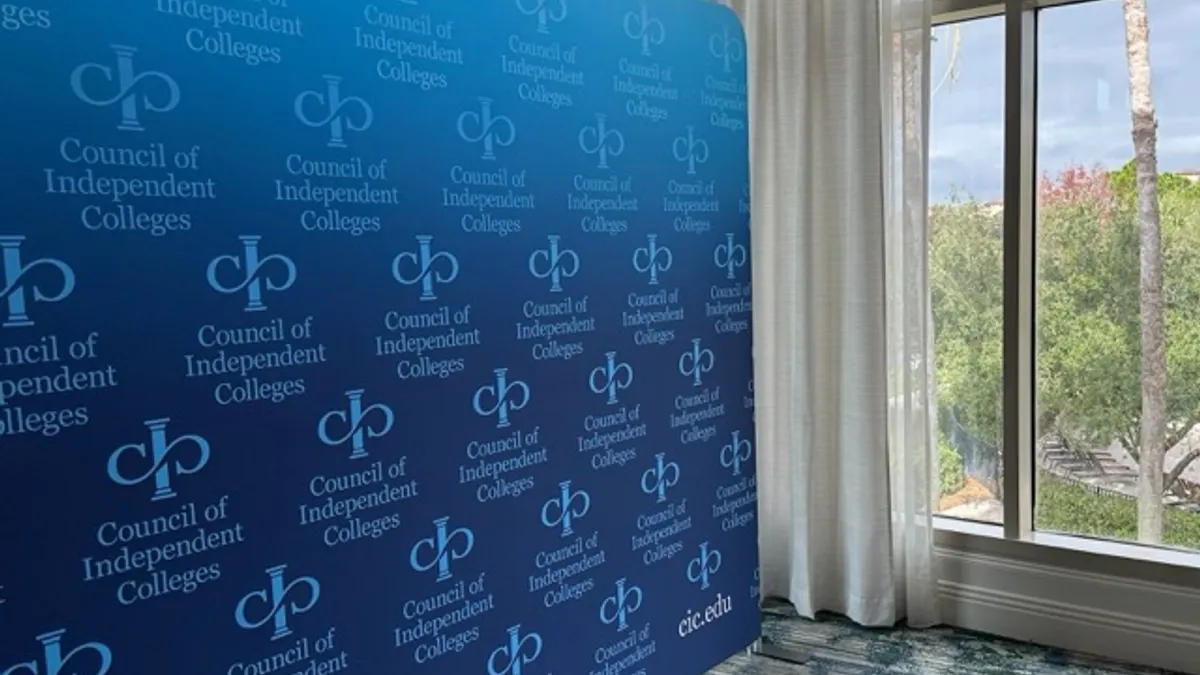Faculty groups and employee unions are urging universities to reject a proposed compact from the Trump administration that would trade control over their policies for preferential access to federal research funding.
Of the nine colleges that received the offer, at least two faculty senates — the University of Virginia and the University of Arizona — voted to oppose the deal and pushed their institution's leadership to reject it. Other instructors and employee groups have also decried the compact.
Leaders at the colleges have thus far issued mostly noncommittal responses, with none publicly announcing they would decline the deal as of Wednesday afternoon.
Along with UVA and the University of Arizona, the Trump administration sent the compact to Brown University, Dartmouth College, the Massachusetts Institute of Technology, the University of Texas at Austin, the University of Pennsylvania, the University of Southern California and Vanderbilt University. It gave the institutions until Oct. 20 to respond with feedback and up to Nov. 21 to sign.
Faculty groups weigh in
At a Monday meeting, the University of Arizona's faculty senate approved a resolution opposing the compact in a 40-8 vote, with one member abstaining.
The resolution called the compact a danger to “the independence, excellence, and integrity" of the institution and the constitutional rights of the campus community.
“Others wiser than I have called it recently a trap, a poisoned apple," Faculty Chair Leila Hudson said before the vote. "Federal funds are not a drug that we need a quick fix of to be forever extortable."
Hundreds of miles east, faculty at the University of Virginia similarly rebuked the Trump administration's proposal.
The UVA faculty senate on Friday, in a 60-2 vote with 4 abstentions, approved a resolution whose preamble called the compact a danger to the university that runs antithetical to its mission and traditions. It also said the deal "likely violates state and federal law."
At least one law firm, Ropes & Gray, has said the compact raises legal questions, adding that it "does not explain the statutory or other basis that authorizes the Administration to give preferential access to federal programs.”
The law firm also said the compact used vague and broad language and doesn’t explain key elements of the proposal. For instance, it threatens to strip federal funding from institutions that sign and then violate its terms — but it doesn't explain which dollars could be revoked.
"Would all federal benefits — research dollars and beyond — be affected by an instance of non-compliance, or would only those additional or new federal benefits that have accrued as a result of the institution having signed onto this Compact (the scope of which is unclear as well) be affected?" it posited in a Wednesday analysis.
A second round of deals?
Two of the institutions that received the offer — Penn and Brown — have previously struck deals with the Trump administration.
Penn President J. Larry Jameson said Sunday that he would seek input on the compact from the campus community, including Penn’s trustees and faculty senate.
"The long-standing partnership with the federal government in both education and research has yielded tremendous benefits for our nation. Penn seeks no special consideration," he said in a statement.
Jameson added that he would keep five factors front of mind: "freedom of inquiry and thought, free expression, non-discrimination, adherence to American laws and the Constitution of the United States, and our own governance."
In March, the Trump administration suspended $175 million of Penn's research funding over its prior policy permitting transgender women to compete in women’s sports. The U.S. Department of Education formally alleged in April that the university's policies had violated Title IX, a law banning sex-based discrimination at federally funded institutions.
In July, Penn struck a deal with the Trump administration. The university agreed to follow the administration’s new interpretation of Title IX, revoke swimming titles and awards that had previously been won by transgender women, and write personalized apology letters to impacted cisgender athletes who were on the women’s swimming team.
Among other things, agreeing to this compact would restrict university employees from speaking out on political issues, limit the enrollment of foreign students, and once again require the university to essentially deny the existence of transgender students.

Steven Brown
Executive Director, American Civil Liberties Union of Rhode Island
Following Jameson's response this week, a petition opposing the compact organized by two Penn employee unions garnered some 1,300 signatures as of Wednesday afternoon. The university's American Association of University Professors chapter is also promoting an Oct. 17 campus rally to protest the compact.
Brown has thus far not issued a public statement on the proposed deal and did not respond to a request for comment Wednesday. But the American Civil Liberties Union of Rhode Island urged Brown President Christine Paxson to stand against the Trump administration.
"Among other things, agreeing to this compact would restrict university employees from speaking out on political issues, limit the enrollment of foreign students, and once again require the university to essentially deny the existence of transgender students," Steven Brown, executive director of the group, said in an Oct. 3 letter. "The compact makes no serious attempt to hide its real intent."
The civil rights organization drew parallels between the Trump administration's latest proposal and Brown University's settlement with the federal government in July. The university agreed to pay $50 million to state workforce development organizations and give the White House oversight of its admissions in exchange for a restoration of federal funding frozen over claims related to antisemitism and other civil rights violations.
"We believe that your university’s previous capitulation has simply empowered and emboldened the Trump administration to demand more," it said. "It is only by sending a clear, strong, and visible message that these attacks on the mission of higher education will not be tolerated that one can ever hope to stop them."
‘A devil’s bargain’
Dartmouth President Sian Beilock issued a short statement about the compact on Oct. 3.
"I am deeply committed to Dartmouth’s academic mission and values and will always defend our fierce independence," she said. "You have often heard me say that higher education is not perfect and that we can do better. At the same time, we will never compromise our academic freedom and our ability to govern ourselves."
In a joint op-ed, two faculty members from Dartmouth and Vanderbilt called the compact “a devil’s bargain."
"Any institution that yields to these broad and intrusive demands would give up its legal rights and would forever be subservient to the whims of the government," wrote Vanderbilt professor Lisa Fazio and Dartmouth professor Brendan Nyhan. "If the Justice Department decides that a signatory violated the vague terms of the agreement, that university would be forced to return all federal money it received in that year — along with any private donations at donor request."
Vanderbilt has not commented on the compact publicly, but President Daniel Diermeier told the student newspaper that the university is reviewing the offer. Diermeier has also previously aligned with some of the Trump administration’s higher education positions, such as supporting institutional neutrality.
An anti-compact petition organized by Vanderbilt Graduate Workers United had over 920 signatures, including from students, active and former employees, alumni and community members, as of Wednesday afternoon.
"This compact represents nothing other than a fascist takeover of higher education in the United States," the petition said. "And we will not allow it to happen."
The graduate workers union said it intends to deliver the petition in-person to the administration.























